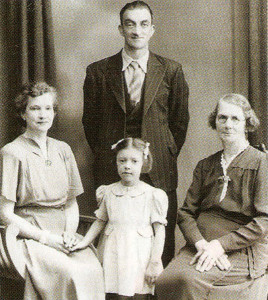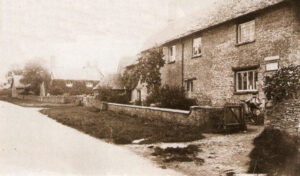
My father Ron Edgington was one of those characters who could keep you enthralled for hours. Born in Ascott under Wychwood in 1909, he quickly learned to find his own entertainment, but times were hard. Before school he’d walk out to Reynolds’ Farm on the Shipton Road and carryback a pail of pigs’ chitterlings. After school it would be straight up to the allotment until tea time.
His home in High Street had housed his father all his life and was now the local post office, run by his parents. It is a listed building because of the carving over the front downstairs window. Dad’s brother Reg lived there after his marriage, and my Aunt Sonia still lives there today.
Dad would say: “We didn’t have overcoats. We used to get an old cycle wheel and bowl it along to Shipton. Then we’d put it in the brook to cool off, and then run back. That kept you warm”.
In the summer the lads went swimming in the river. The Evenlode runs just outside the village. It’s a picturesque area but with a strange image. If you stand on the small bridge at the bottom of ‘Chippy Hill’ and look to your right, the water appears deep and calm. Turn to your left, and the same river is fast- flowing and fairly shallow. Even as a child, I found this fascinating. So why throw each other in the river?
“If we had a boy who couldn’t swim. We threw him in. He got himself out,” Dad would say. ’’There was a spot further up that was bottomless. Some of us tried to get to the bottom but we couldn’t. We would hold our noses with one hand, put the other arm up, shout ‘Right’ and down we would go.
You cannot imagine that happening today. It belonged to period of its own.
“We had got this cart (his warm country accent pronounced it ‘caarrt’) and two of us were in the shafts, no horse or nothin’,
and we were coming down Chippy Hill” (a mile long and connects the Chipping Norton to Burford road with Ascot in the valley). “As it went faster, the shafts started to lift and we lads were pedalling in the air, but we had to keep pedalling for it came down again”.
I always had visions of what happened when they got to the bridge, which is set at a slight angle to the hill, but all I could get out of Dad was a cheeky smile and “Oooh Aaah”.
In my teens I would go down the same hill on a bicycle, but I always thought of the cart.
It was difficult sometimes to know if his yarns were true, or true entertainment. For instance, the prayers at the village chapel.
“Oh Lord, bless me and my wife, our Walt and his wife, we four, no more. Amen”, followed by “May Mr Musty have a good crop ofwheeeeeeat”.
It is even more difficult to write things phonetically. The beauty was in the delivery.
“I met old Silas and I says to him ‘Where be you going then?’ and he says ‘I bient, I be going back’.
“So I says to ‘im: ‘Which be your house?’ and he says ‘You know that one whitewashed yellow?’ and I says ‘Aye’. ‘Well,’ he says, ‘thatbient our’n’.
“But ‘is wife says she’s not stopping up for ‘im when he’s been in the pub. ‘The next time ‘e comes home late, ‘e can go down an ‘lethisselfin ‘cos I shan’t’.”
In the 1940s my father joined the Oxfordshire Special Constabulary, and the Wychwood Division of the St. John Ambulance, giving many years’ service to both.
Apart from bell ringing, his other love was morris dancing and country dancing which he taught in all the Wychwood villages. I think this is the thing for which he would most like to be remembered.
While working at Little Riss-ington aerodrome he had an accident which affected him for the rest of his life, and curtailed his activities, but he carried on dancing with limitations. He improved as the years crept on and was dancing in his seventies.
Unfortunately I inherited his sense of humour, and always remember things I shouldn’t.

We were dancing at Bourton on the Water on a beautiful lawn.
Suddenly all the worms started to come up. They must have thought it was raining!.
I have an eight-page speech of his which details the history of the dance and includes stories about Cecil Sharp, William Kimber and Reginald Tiddy. I realise now how knowledgeable he was.
The following paragraph is copied from his own writing.
“Mr. Tiddy had the hall built after buying the land, and in 1912 with Miss M Sinclair retaught the dancers at Ascott, and its use was for country dancing. After his death his father gave it to the village and it was renamed Tiddy Hall. I remember the evening when the tablet was unveiled. Frances, my sister was pianist for the dancing, and they danced at different places, like we have. There is a tradition referring to Ascot about morris. The sword bearer would have a round tin with cake in it and one had to cut a piece for luck. He preceded the dancers.”
I can’t let him have the last word, so let’s go back to Chippy Hill.
Trees used to line the road almost all the way down, but many have gone now. Jacob and Esau are still there, though, about half way down on the left. As the village school was a church school, we had to learn all the bible stories. We’d just covered the story ofjacob and Esau when our teacher took us on one of our nature walks. We stopped at the two trees – one smooth, the other with a had a hairy appearance – and were asked which of the brothers was smooth and which was hairy. From that day we called themjacob and Esau.
I loved walking up the hill with Dad. We would look for violets in the hedgerows, and knew exacdy which field would have cowslips or moon daisies.
He was a wonderful person, and it was a beautiful place. What memories.
Frances Harris








